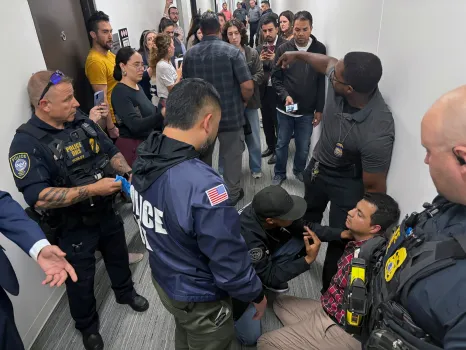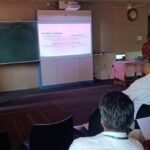ICE Arrests Nearly 550 in Chicago-Area ‘Midway Blitz’ Operation

A Major Immigration Crackdown in Chicago
Federal immigration agents have carried out one of the largest enforcement operations in recent years in the Chicago area. Over the course of two weeks, officers from U.S. Immigration and Customs Enforcement (ICE) arrested nearly 550 people in an action they called “Operation Midway Blitz.”
The operation, named after Midway International Airport, targeted people living in Cook County and nearby suburbs. ICE says the arrests focused on individuals with criminal records, gang ties, or past deportation orders. But for immigrant families and communities, the raids have triggered fear, confusion, and anger.
Why Was the Operation Launched?
ICE explained that “Midway Blitz” was an intelligence-driven action, meaning agents used records, databases, and investigations to identify who they were going after. Officials said this was not a random sweep, but a “targeted enforcement” action.
The agency said it prioritized:
- People with prior felony or misdemeanor convictions.
- Individuals with gang affiliations.
- Those with pending deportation orders.
- People who had illegally re-entered the U.S. after being deported.
Who Was Arrested?
According to ICE, around 545 people were taken into custody. Here’s the breakdown:
- About 65% had criminal records, including drug offenses, assaults, and domestic violence.
- 15% were linked to street gangs.
- 20% already had deportation orders but had not left the country.
The detainees came from more than 30 countries. Most were from Mexico, but others were from Guatemala, Honduras, El Salvador, India, Poland, the Philippines, and several African nations.
Officials said the group included both men and women — around 400 men and 145 women.
ICE’s Justification
At a press briefing, Rebecca Aducci, the field office director for ICE in Chicago, defended the operation.
“Our job is to make communities safer by removing people who break the law and have no legal right to be here. This operation shows that ICE is focused on criminals, not ordinary families,” Aducci said.
ICE highlighted several cases to show why it carried out the raids, including:
- A 39-year-old Honduran man previously convicted of child sexual assault who had returned to the U.S. after being deported.
- A Polish citizen with multiple drunk-driving charges and a pending case for domestic violence.
- A Mexican national associated with a Chicago gang who was wanted for weapons trafficking.
Reactions From the Community
The arrests quickly drew strong reactions from immigrant-rights groups, local leaders, and families.
The Illinois Coalition for Immigrant and Refugee Rights (ICIRR) criticized the raids, saying they caused panic in neighborhoods where many immigrants live and work.
“Parents are afraid to send their kids to school. Workers are scared to go to their jobs. This isn’t about safety — it’s about fear,” the group said.
Community centers in Chicago neighborhoods like Little Village and Pilsen began organizing “Know Your Rights” sessions, teaching residents how to handle encounters with ICE officers.
Political Responses
The operation also split politicians in Illinois.
- Governor J.B. Pritzker (Democrat) slammed the raids as “abuse of federal power” and promised that Illinois would remain a “welcoming state” for immigrants.
- Chicago Mayor Brandon Johnson reminded residents that the city is a “sanctuary city,” meaning local police do not help enforce federal immigration laws.
- But some Republican lawmakers praised ICE’s efforts. Congressman Mike Bost said: “Law-abiding citizens deserve safe communities. Removing criminals who have no right to be here is the right move.”
Concerns About Families and Rights
Lawyers and human-rights organizations raised serious concerns about how the operation was carried out.
Some detainees reportedly did not get immediate access to lawyers. Families fear parents may be deported while children — including U.S.-born kids — are left behind.
The ACLU of Illinois said it is reviewing whether ICE violated due process rights, pointing to past lawsuits that challenged mass raids.
Psychologists have also warned that immigration raids leave children traumatized. Kids often suffer from anxiety, nightmares, or difficulties in school after witnessing a parent being arrested.
Did Local Police Help?
ICE said some suburban police departments assisted with logistics, but the Chicago Police Department did not take part, citing the city’s sanctuary policies.
This difference reflects a larger debate: Should local police cooperate with federal immigration agents? ICE argues that cooperation is needed to catch dangerous criminals. But critics say it makes immigrants too scared to call police when they are victims or witnesses of crime.
A Bigger National Trend
The Chicago operation is part of a broader nationwide push. ICE has conducted similar raids in Los Angeles, Houston, Atlanta, and New York.
Immigration enforcement often becomes more visible during election seasons, when the national debate heats up. Some politicians stress border security and law enforcement, while others call for pathways to legal status and humanitarian protections.
Illinois is home to 1.7 million immigrants. The state has passed laws giving undocumented residents access to driver’s licenses, health care, and even state-funded legal aid — showing its clash with federal immigration policy.
Families Left in Limbo
For many families, the raids caused heartbreak. Advocacy groups shared stories of children coming home from school to find parents gone, or spouses unsure if loved ones would ever return.
Community groups are now providing emergency food, shelter, and counseling for affected families. Churches and nonprofits have stepped in to support those left behind.
What Happens Next?
The 550 detainees will now enter different legal processes. Some may face immediate deportation through “expedited removal.” Others may fight their cases in immigration court, seeking asylum or other protections.
Those with serious criminal records or who re-entered the U.S. illegally after deportation could face federal prison sentences before being removed again.
Meanwhile, immigrant-rights groups say they will challenge the operation in court and lobby Congress for comprehensive immigration reform.
- Chicago deportation raids
- Chicago immigrant advocacy reaction
- Chicago immigration enforcement
- Chicago immigration raids
- Chicago sanctuary city policy
- Chicago-area immigration crackdown
- Cook County ICE arrests
- ICE arrests 550 immigrants
- ICE arrests Chicago 2025
- ICE Chicago operation
- ICE raids Chicago September 2025
- Illinois immigration news
- immigrant rights Chicago
- impact of ICE raids on families
- Operation Midway Blitz ICE
Recent Posts
Categories
- Actor4
- Actress7
- Assam1
- Bank4
- Bihar5
- Biography2
- Bollywood4
- Business11
- Company9
- Cricket7
- Economy24
- Education7
- Election3
- Entertainment71
- External Affairs Defence Security1
- Finance1
- Football2
- Haryana1
- Health2
- Hollywood2
- Home2
- India84
- India10
- Industry6
- Karnataka1
- Kerala1
- Latest News77
- lifestyle1
- Maharashtra10
- Market7
- Politicians13
- Politics29
- Press Release798
- Social8
- Sports29
- Tamil Nadu2
- Technology25
- Tollywood3
- World49
- World17
Related Articles
PM GatiShakti’s Network Planning Group Reviews Infra Projects
India’s infrastructure is evolving at a pace never seen before. From world-class...
ByNewsium DeskOctober 17, 2025Karnataka Okays Bengaluru Corridor to Cut Traffic 40%
A Long-Awaited Step Toward a Smoother Bengaluru Bengaluru — often called the...
ByNewsium DeskOctober 17, 2025Kerala SIT Arrests Prime Accused in Sabarimala Gold Case
Major Breakthrough in Temple Gold Case The Special Investigation Team (SIT) of...
ByNewsium DeskOctober 17, 2025Bihar Polls 2025: BJP Unveils First List of 71 Candidates
A Political Season Begins in Bihar The stage is officially set for...
ByNewsium DeskOctober 14, 2025














Leave a comment